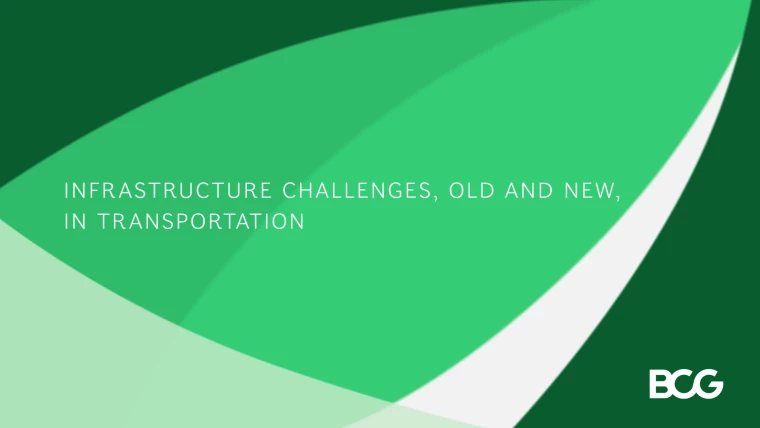What’s in the Bipartisan Infrastructure Law?
The Bipartisan Infrastructure Law—also known as the Infrastructure Investment and Jobs Act—is a once-in-a-generation investment in the United States’ core infrastructure. The bipartisan legislation provides for $1.2 trillion in spending over the next five years, including $550 billion in new spending for roads, bridges, public transit, power systems, broadband, water systems, climate resilience, and more.
This investment presents a massive opportunity for federal, state, and local governments to rebuild the country’s aging cities, roads, and bridges. It will create new jobs, combat climate change, and spur economic opportunity for disadvantaged communities. The 2021 Infrastructure Bill also presents opportunities for the industries that partner with governments to plan, develop, and operate US infrastructure.
BCG works closely with federal, state, and local governments—as well as partner industries—to help invest public dollars efficiently and equitably in:
What Makes BCG Different?
- We have hundreds of experts throughout the US who specialize in the public sector, transportation and logistics, power and utilities, technology and telecommunications, and more.
- BCG’s green procurement framework enables procurement functions at all levels of government—central, regional, and local—to reap the full benefits of green public procurement and reduce the world’s carbon footprint.
- BCG’s proprietary tools allow organizations to forecast trends, predict job growth, gain market insights, maximize productivity, and track metrics on outcomes
- BCG has strong partnerships with world-leading climate organizations. We are a consultancy partner to COP26, the World Economic Forum, WWF (World Wide Fund for Nature), the Science Based Targets initiative, and CDP, to name a few.
- BCG’s Center for Climate & Sustainability brings together 550 experts from across the firm to address the full range of sustainability topics, including decarbonization, climate innovation, transition financing, water management, and other ESG issues relevant to the new infrastructure bill.
- We have partnerships with federal, state, and local governments across the US and extensive experience coordinating among these entities.
The United States infrastructure bill will deliver immense investments in transportation, broadband, clean energy, and cities across the US. BCG has decades of experience maximizing return on investment in all these areas.
Our transportation consulting team has deep experience driving successful transformations for airports, roads, railways, and ports.




Our experts in technology and telecommunications have broad expertise in addressing the social and economic imperative of expanding broadband access.


BCG provides the expertise and capabilities needed to transform energy organizations and ensure the success of tomorrow’s leaders.



Our team comprises a deep roster of practitioners from the engineering and construction industry. Over the past five years, we have delivered more than 600 projects worldwide.


Our cities and real estate consultants work with clients across the industry value chain to advance strategy, drive operations improvements, and create smart built environments.




BCG helps federal, state, and local governments design strategies to effectively invest public dollars, sustainably procure goods and services, and drive transformational change.


